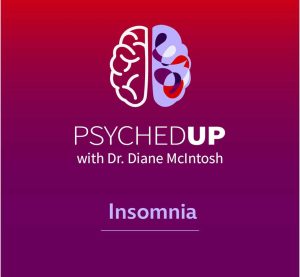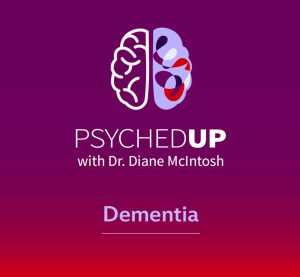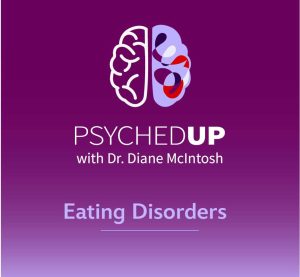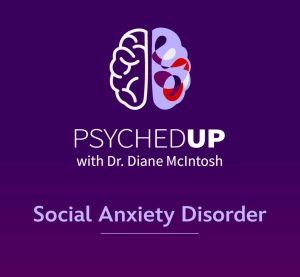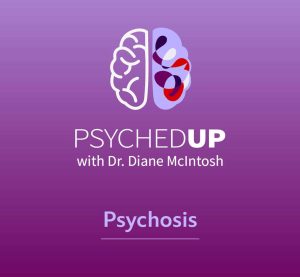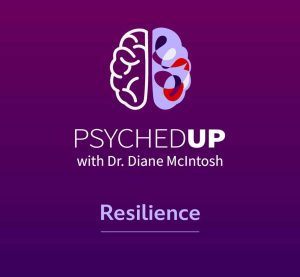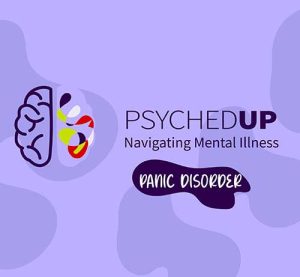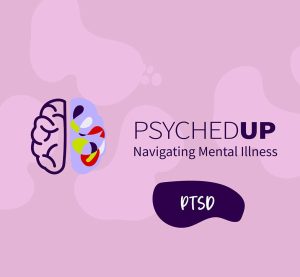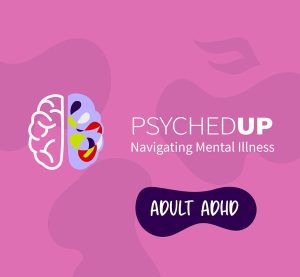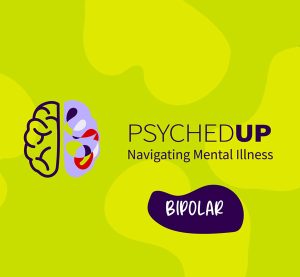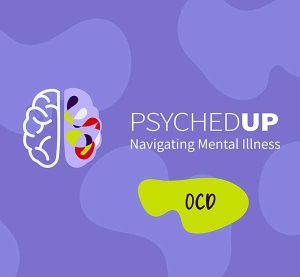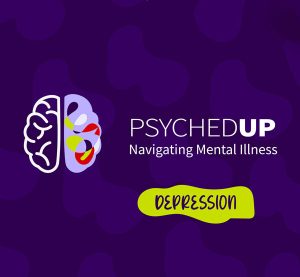
Episode 3: This is Adult ADHD
ADHD is often associated with creativity, quick thinking, and boundless energy, traits that many admire and even consider superpowers. But for individuals with untreated ADHD, the reality can look very different. Untreated symptoms can lead to challenges that impact daily life and well-being. Yet, ADHD is one of the most treatable neurodevelopmental conditions.
So, let’s dig into ADHD with psychiatrist Dr. Diane McIntosh. She answers lingering questions like: Is ADHD over diagnosed? Are the medications safe and truly necessary?
Joining the conversation is Robert, a young professional who not only lives with ADHD but thrives with it. And, as always, PSYCHEDUP’s resident psychologist, Dr. Randy Mackoff, talks about treatment options with Dr. McIntosh.
Listen to This is Adult ADHD:
This is Adult ADHD Podcast Transcript:
00:00:02
Robert: Obviously, no kids like school, but I despised school. Sunday evening was a day of mourning and sadness. And people talk about it now, the Sundays, and I go, “You have no idea what the Sundays used to be.”
00:00:16
Dr. Diane McIntosh: This isn’t an uncommon memory for people with untreated ADHD. In this episode, we’re going to learn more about the disorder, its causes, symptoms, and treatment. I’m Dr. Diane McIntosh. You’re listening to PSYCHEDUP.
On this show, each episode will focus on one mental illness. Today, it’s ADHD or Attention Deficit Hyperactivity Disorder. As a psychiatrist, I want anyone experiencing any of these illnesses to be able to hear these stories and know there is a path ahead. My goal is to educate, destigmatize, and inspire. Welcome to PSYCHEDUP.
So the basics of ADHD. It’s a highly prevalent neurodevelopmental condition, which means it’s associated with the development of the nervous system, how the brain grows and matures. There are two major clusters of ADHD symptoms, inattention and hyperactivity impulsivity. Each person may present differently. Some people are obviously hyperactive or impulsive, while others are highly inattentive, or they may have a hefty dose of both. There’s no doubt that the symptoms can change over time as the brain matures.
Back when I was in medical school, even in the two years I spent in training as a pediatric resident, I was taught that ADHD was a childhood disorder that mysteriously disappeared when the kid turned 18.
00:01:40
Clip: Happy birthday.
00:01:42
Dr. Diane McIntosh: We now know that’s largely incorrect. According to mountains of scientific research gathered over decades, for the majority of people, their ADHD persists, at least to some degree, into adulthood.
To understand a little bit better what it’s like to live with ADHD, I’d like to introduce you to someone.
00:02:02
Robert: Hi, I’m Rob. I’m an adult with ADHD.
00:02:04
Dr. Diane McIntosh: Rob got the sense early on that he was different than other kids at school.
00:02:08
Robert: I was a little bit more impulsive and maybe a little bit more rowdy with like if we were playing soccer outside and I thought someone did a handball or something, I would maybe be a little bit probably more bothered than the other kids. I would sometimes say something stupid and I would get in trouble for that.
00:02:26
Dr. Diane McIntosh: Kids with hyperactivity or impulsivity associated with ADHD can’t wait their turn.
00:02:31
Clip: Me next.
00:02:32
Dr. Diane McIntosh: Constantly intrude and interrupt.
00:02:34
Clip: Excuse me, I was talking.
00:02:35
Dr. Diane McIntosh: And they don’t think about the potential consequences. On top of this, and perhaps because of this, they’re accident prone, they’re much more likely to abuse substances, quit school, have unwanted pregnancies, and get into trouble with the law.
Then, later in life, adult consequences resulting from the same challenges can also be enormous. They run the gamut from being unable to maintain friendships or employment due to inappropriate behaviors or comments, or failing to complete work or follow through on commitments. Adults often struggle with their finances, whether overspending or failing to pay their bills. Commonly, they drive too fast or erratically, they’re more apt to use illicit drugs without considering the consequences and are more prone to serious accidents.
Of course, with all that, it’s no surprise that this can lead to job loss, social challenges, incarceration, and a greater risk of premature death compared to adults without ADHD. In short, ADHD can come with very serious consequences. For Rob, he wasn’t just struggling outside at recess, he was also struggling in the classroom.
00:03:50
Robert: I also got in a lot of stupid trouble for stupid things like not putting the date in the corner, always forgetting. Never putting the title with a ruler line because I was like, “Whatever, I just want to get it done.”
00:04:00
Dr. Diane McIntosh: But those little things, they started to add up.
00:04:04
Robert: I hated school, hated it completely. I would just have a lot of trouble just even engaging with what the teacher was saying. Spent a lot of time just staring at the clock. It was a deflation.
00:04:16
Dr. Diane McIntosh: And that deflation inevitably affected his grades and his confidence.
00:04:21
Robert: I thought that because I was struggling in school, it meant I was bad at school, and that’s obviously not a great feeling. I just felt it was something I wasn’t good at, so why try.
My parents did go in, I remember in fourth and fifth grade they’d come in for meetings every now and again to talk to the teachers and stuff, but it was stuff like, “Robert’s desk isn’t organized.” They could tell I was miserable at school. And every day, homework and stuff was terrible. Actually, looking back on it, I feel kind of bad for them because a lot of kids, they go home, they do their homework, no problem. I hated it. It was always a struggle.
00:04:51
Dr. Diane McIntosh: So how do we go from a kid or an adult struggling with ADHD to being properly treated? Let’s dig into diagnosis.
As I repeat in every episode, in psychiatry we have no objective tests, no brain scans or blood tests that can help us to ensure we have the right diagnosis or to guide our treatment choices. However, we do have clinical scales, scientifically validated questionnaires that I use when making a diagnosis and following my patient’s response to treatment.
When diagnosing children, ADHD assessments usually involve gathering questionnaires from parents and teachers, as well as a professional evaluation of the child. For adults, an assessment includes clinical scales and, if possible, I always give a scale to someone closest to them so that I have another perspective. I do that because an adult often understates their ADHD symptoms. They’ve been living with them their entire life, so their spouse or close friend may provide a more accurate assessment or at least add some valuable insights regarding the impact of their symptoms.
It’s actually interesting how different they are. A wife might report that she has no difficulty paying attention when someone’s speaking directly to her, while her husband says it happens all the time. So obviously my job is to explore the differences between the responses and try to get to the best possible understanding of my patient’s experience, not to take sides in the marital dispute.
For Rob, he was diagnosed when he was just entering his teens.
00:06:25
Robert: My dad, at the time, was working for a pharma company. There were packages that he would have that he would give to doctors in the back of the car. And me sitting in the back of the car reading shampoo bottles, if it’s back there, just anything. And I was reading this and I was like, “This kind of seems like me, doesn’t it?” And it was about this kid who couldn’t pay attention.
00:06:42
Dr. Diane McIntosh: Sure, Rob credits his dad with helping him discover he had ADHD, but I think his mother also played a large part.
00:06:50
Robert: Well, yeah, because my mom was a psychiatrist, I was able to get to a really good specialist.
00:06:55
Dr. Diane McIntosh: That’s right. I’m not just a psychiatrist, I’m also Robert’s mother.
00:07:00
Robert: Hey, hey. Mom, good to see you.
00:07:01
Dr. Diane McIntosh: Hey, sweetheart, how are you? You’re a trooper to come out and talk to your mother about ADHD, so I’m really, really grateful for you.
00:07:10
Robert: Talking is the type of volunteer work I’m happy to do.
00:07:14
Dr. Diane McIntosh: That is the most Robert comment ever.
So we’ll get back to Robert soon because I want him to have a chance to talk about what a diagnosis meant for him. But first, let’s get into how to treat ADHD and some of the controversy surrounding the medications that are prescribed to children and adults with this disorder. And to do this, I have my friend and colleague, psychologist Dr. Randy Mackoff with us. And among his many gifts, he’s an expert in talk therapy. Thank you for joining us, Randy.
00:07:45
Dr. Randy Mackoff: Well, thank you for having me, Diane.
00:07:46
Dr. Diane McIntosh: I don’t know about you, Randy, but for me, ADHD is absolutely the most gratifying disorder I get to diagnose and treat because the treatments are so incredibly effective for people. I’ve seen it with Robert, but of course with my own patients, treatment can be transformational.
00:08:03
Dr. Randy Mackoff: Maybe a little bit of a difference is that by time people see you as a psychiatrist for medication, they are ready for medication. I sometimes have a lot of, not sometimes, frequently have discussion if it’s with children or even with adults, there is a reluctance, first of all, to understand ADHD because they want to attribute to either their own intellect or lack of discipline or something about themselves. And also, when I’m dealing with parents, often there is, “I don’t want my child medicated.”
It’s understandable, no one wants to take medication unnecessarily. But what often they don’t realize is that this isn’t something where you pull yourself up by your bootstraps. This is something where medication is extremely beneficial as you’re the expert in that.
What I do as a psychologist is some educational component to that and understanding the fears and trying to not talk somebody into something but informing them, letting them make the decision, and then hopefully connecting with you or another really good psychiatrist or their personal physician who can explain the medication and what to expect and get them started.
00:09:08
Dr. Diane McIntosh: So I just want to make sure we get this down. Psychologists are a warm-up act for the psychiatrist, right? Is that what I just heard?
00:09:17
Dr. Randy Mackoff: Yeah. No, I don’t think so.
00:09:20
Dr. Diane McIntosh: Yeah, I think that’s everything that’s fit to print really right there. Thank you very much. So-
00:09:25
Dr. Randy Mackoff: Yeah, another way of, well, we could say that the other way is the psychologist does the heavy lifting.
00:09:29
Dr. Diane McIntosh: Touche. Touche.
00:09:34
Dr. Randy Mackoff: Could you tell me a little bit about medication, what they can expect and what the types of medications are and all that sort of thing?
00:09:40
Dr. Diane McIntosh: The first thing to say is that when you’re talking about ADHD, one of the best things about the treatment is the treatments themselves, because they are amongst the most effective treatments, not just in psychiatry, but in medicine. They do their job very well. These medications have been tested over 60 years. There are thousands of studies showing they’re safe and safe in a population where we usually don’t test medications, in children.
There are two main groups of medications to treat ADHD. One is the psychostimulants and that includes two main types, the amphetamines and methylphenidate. Then there’s the non-stimulant group, that includes medications like atomoxetine and guanfacine. Most people respond extremely well to a psychostimulant. They’re usually very well tolerated, which means the side effects are usually mild and most often short-lived.
When it comes to treatment, guidelines almost universally recommend trying a long-acting psychostimulant first. That’s just because they’re easier to take, usually once a day in the morning and they last throughout the work day or the school day. In fact, it’s the long-acting psychostimulants as a group that are amongst the most effective treatments in medicine. Across the board, they’re the best place to start.
So how do you know which type, methylphenidate or amphetamine, will work best for you? Well, we don’t. So I try one first and if my patient isn’t having an excellent response or they’re having some side effects, then we try the other. You’ve got nearly a 70% chance that the first one will be the best one for you. But if it’s not, please don’t give up. Given their incredible potential benefits in treating ADHD symptoms, it’s worth taking the time to find the one that works best for you.
If neither psychostimulant works well or they’re not well tolerated, that’s when I look to the non-stimulant group of medications. They’re not quite as effective, but they can be very helpful, whether added to a psychostimulant or as a stand-alone treatment when people don’t do well on a psychostimulant.
I know from experience the word amphetamine can provoke fear. Isn’t that dangerous? Street amphetamines like crystal meth for instance, they do have some similarities, but they are definitely not the same drugs. Street drugs have impurities, whether intentional or accidental, and that increases their toxicity. They cross into the brain very quickly and they provoke a high.
There is no question that some prescribed stimulants can be misused. They can be ground down and snorted or injected, so I avoid those kinds of treatments. There’s also some confusion about giving someone who’s already hyperactive a stimulant because stimulants are thought of as being, well, stimulating, causing people to be more hyperactive or more energetic. However, people who have ADHD experience a calming effect when they’re prescribed a psychostimulant. They’re less hyperactive, more able to focus, and less impulsive.
So let’s get back to Robert. He was diagnosed by a child psychiatrist. And being treated for his ADHD, it was transformative for him. We didn’t talk about the diagnosis with his teachers, but regardless, they noticed an immediate difference in him.
00:13:00
Dr. Randy Mackoff: Some of the things I hear back though from parents and from patients is either weight loss or weight gain. And how does that get addressed with medication?
00:13:09
Dr. Diane McIntosh: So kids and adults, they do respond differently to medications. We know that these are extremely safe, but children do commonly have a reduced appetite, especially early on. So I urge parents to make sure their child has a really good breakfast before they take the medication. I remember Robert’s psychiatrist actually prescribed Nutella, much to his delight. Of course, we want children to grow and studies show that those treated with a stimulant medication for ADHD have normal growth.
Most adults do not complain about weight loss. But any weight loss associated with taking a psychostimulant is usually quite short-lived, sometimes resolving within a matter of weeks. Some adults do lose weight because they have less impulsive eating.
As for other common side effects, psychostimulants can make it more difficult to sleep. But again, that side effect doesn’t usually last very long. That’s why I don’t increase doses until all minor side effects are gone. Then it can be slowly increased until the dose is optimal. And by optimal that means the dose that’s very well tolerated and manages all the ADHD symptoms well.
Because you’re taking a stimulant, it’s really important to avoid or at least try to cut down on other stimulants like coffee or caffeinated drinks. And I know, that’s really difficult because before you’re diagnosed or treated, lots of people heavily rely on caffeinated drinks. Now they’re nowhere near as effective as taking a psychostimulant prescribed by your doctor, but if that’s what you’ve got, that’s what you use.
00:14:46
Dr. Randy Mackoff: That’s great, that’s good information to have because as a psychologist, I get those types of questions. The other question I have that comes forward quite often is they’ll say, “Well, my physician started us on a really high dose, and they said you start with a high dose and then you work down to a lower dose.” And others who, the majority say, “No, we’re going to start off and then we’re going to titrate up to something that is therapeutic.” And you’re the expert, what’s the answer to that?
00:15:10
Dr. Diane McIntosh: I’ve been a psychiatrist for 25 years treating ADHD for a good part of that. I have never heard that before, so thank you for bringing it up. Every medication that I prescribe in psychiatry, I start low, I go slow, but I aim for all the symptoms to be resolved. So I would never start with a high dose, that’s when you’re most likely to have side effects. Whereas when you start at a low dose, your body acclimatizes to any early side effects, and generally, for most medications, those early side effects are gone within a couple of weeks.
Let’s talk about what you know best, which is the approach to ADHD from a talk therapy perspective. And I generally don’t think about psychotherapy as a first line, that’s because the science tells us it’s not, for the treatment of ADHD. The medications really are the bomb when it comes to treating ADHD, but there are still really important psychotherapeutic supportive approaches, talk therapy approaches for ADHD. Can you talk about that?
00:16:15
Dr. Randy Mackoff: One of the things that when you talk about psychology and psychotherapy, talk therapy and not being the go-to for ADHD, I’m in agreement with you. Not all psychologists are. There are psychologists who believe strongly that talk therapy is really going to be the way of dealing with ADHD. I’m not sure what evidence they’re relying on, but they do. There are people who are psychologists who are trained in basically ADHD coaching, which really works with the child or the adult and family and helps them understand what’s happening with ADHD and some behavioral ways of managing some of this.
Again, the behavioral ways I think set people up for a feeling of failure because there’s frequently some difficulties with focus, with impulse control, with other behavioral disturbances. And I don’t mean disturbances like the person is destructive, but if they’re unable to fulfill what they need to do behaviorally. And to say, “You just need to do X, Y, and Z,” when the person actually can’t do it because of what’s happening within their brain, I think that it creates all sorts of difficulty.
00:17:14
Dr. Diane McIntosh: So we’re setting kids up, adults up with having expectations of a brain that simply cannot focus the way other people can. And I think we apply our own, if you don’t have ADHD, our own expectations. Well, if you wanted to, you could. So it’s a parenting failure, it’s a child failure, it’s the person who’s living with ADHD as an adult, it’s all them failing rather than they have a brain that needs to be treated and then the family to be supported, that individual to be supported, to get through those negative thoughts about themselves and to be able to find their own positive path in life.
00:17:53
Dr. Randy Mackoff: Diane, I totally agree. I’m kind of vibrating inside as you’re talking because there’s so much I want to say about this. Because often, what I’ll have is an adult come in and they’ll talk about how they’re not smart, how they had difficulties in school, how they had some behavioral difficulties. They really struggled with mathematics. But yet they could really focus on one thing and they could excel at one thing, and yet they still view themselves as being not smart.
As a matter of fact, when I look at the evidence, what I see, and this is what I talk to my patients about, is that actually when we look at IQ, which we normally see as a normal distribution, individuals who are diagnosed with ADHD typically have actually higher IQs, intelligent quotients, and that they are actually quite smart. And their view of themselves is negative, not because of their actual intellect, but because of their ability to perform because of what’s happening within their brain.
And there’s a great book that I like people to read just the first two pages of when they have ADHD because they can’t read the whole book often. And it talks about the symptoms, and then it talks about the strengths of the symptoms and then some of the downsides of the symptoms, called ADHD 2. 0, written by two psychiatrists who both have ADHD. And when people read those first two pages, they go, “Oh, man, that is a release. How do I get started on treatment?”
00:19:08
Dr. Diane McIntosh: ADHD is our most heritable psychiatric disorder, along with bipolar, and that means you often have parents, at least one, sometimes two, who also have ADHD trying to parent a kid with ADHD. It’s like a setup for challenge. Why don’t you talk about that for a moment, Randy?
00:19:24
Dr. Randy Mackoff: Yeah. Oh, yeah. I see a lot of that where the father will come in clearly ADHD, extremely frustrated with their child. And then we start talking about the father and what the father’s experienced and some of the difficulties that they have had and ways that they’ve overcome it.
And once the light bulb goes on that, “Hey, I have ADHD. It makes sense that my son,” by way of example,”has ADHD.” Then we talk about, “Okay, so how do we work together and how do we get the best treatment? Perhaps even treatment for yourself because your life can become that much more enriched, but also for your child.” And that, we talk a fair amount about and you see it, and like you say, heritable, you see it a lot running in families.
But once you have awareness and you can start making modifications, and modification doesn’t happen instantly, change doesn’t happen instantly, but you keep on working at it, then there’s nothing to feel guilty about because what you’re doing is you’re improving, you’re enhancing your child’s life, you’re enhancing your life, and you’re demonstrating that with knowledge, you can grow, with information, you can grow, and that is something to really be proud of to pass on to your child.
00:20:27
Dr. Diane McIntosh: This was an awesome conversation. Thank you so much.
00:20:30
Dr. Randy Mackoff: Thank you.
00:20:31
Dr. Diane McIntosh: Okay, so let’s get back to Robert. He still remembers the changes he went through once he was being properly treated.
00:20:40
Robert: The first thing I noticed was that I could hit free throws so much better in the backyard. I could focus on the basket. And I actually told the psychiatrist that and he told me, “Yeah, definitely happens, especially when you start early on.”
The other thing was is that I found I was able to focus on individual things a lot better. I was noticing I could listen longer, retain information better, and I could also read for longer. That was a big thing because I always liked reading, but it was always really short stuff. And then come back to it later, I was able to read full articles no problem.
00:21:09
Dr. Diane McIntosh: You went from struggling and getting C’s to being really A’s and a couple of B’s and valedictorian. It made a huge difference. What people don’t understand I think, is when you have ADHD, you can’t focus on things you find boring or that you’re not interested in, but you can hyper focus. Kids hyper focus on things that engage their brain. So parents will say, “Well, my kid can’t have ADHD, they can play a video game for 12 hours straight and somehow focus on that.” It is focusing on things that aren’t interesting or boring.
And when you have ADHD, you can’t do it. It’s not a discipline issue, or if I gave you 100 bucks, you’d pay attention. Your brain just does not work like that. And you used a lot of, without even realizing it, tools to fix that for yourself, like chewing on things, right? You would eat an entire pencil and I would just find the eraser. It was a constant movement to help you to be able to focus. And I’ve had other patients, young patients who have to turn in a circle to be able to focus on brushing their teeth, for instance. Some people need noise, some people need silence, but it’s a constant battle to focus on things that are difficult to focus on.
00:22:22
Robert: Yeah, I would say that’s pretty consistent with how I feel.
00:22:25
Dr. Diane McIntosh: And your procrastination was terrible.
00:22:28
Robert: Oh, yeah, that’s true.
00:22:29
Dr. Diane McIntosh: It’s so much better now. What people don’t realize is ADHD persists for most people. Probably 60, 70% of people who have ADHD as kids continue to have some symptoms of ADHD, but it absolutely changes. You’re more likely to be in car accidents, you’re more likely to end up divorced. All those things that have to do with having patience, being able to follow through, being organized, not procrastinating, all of those things in life have big impacts when you’re an adult.
00:22:59
Robert: Absolutely. The procrastination one, I think is one that took a really, really long time to fix. I would say now I’m very good at not procrastinating because I don’t like the feelings I feel when I’m rushed. I think a lot of that was going through university and having to set my own schedule, knowing when things were due and screwing up a bunch of times, and having that kind of self-induced negative reinforcement and kind of going, “Okay, I can’t do this anymore.” So now I’m very good at not procrastinating at all, really, or I do my best at least.
The other thing that I would say even now I still struggle with, but I’ve implemented systems, is I lost things constantly. Just the mindlessly putting things down where they shouldn’t go, that kind of stuff. And even today, before we started recording, I had to spend 20 minutes looking for this shirt. I knew where it was last Saturday. I can’t help it.
00:23:47
Dr. Diane McIntosh: Okay, folks, this is what I want you to know. This is my shrink wrap. So ADHD is a common psychiatric diagnosis. It affects just under one and about every 20 Canadians. So what are some of the most common misconceptions about ADHD? And honestly, these are the things that frustrate me the most.
First, that ADHD is overdiagnosed. To be sure, misdiagnosis can happen in any disorder. And there’s also a lot of overlap between ADHD and other psychiatric diagnoses like bipolar disorder. However, a recent study, which was published in the British Journal of Psychiatry, stated that the vast majority of people living with ADHD are undiagnosed. And this is serious business.
The same study found that there’s strong evidence that an adult diagnosed with ADHD has a shortened life. An ADHD diagnosis is associated with an average of seven years of life lost in males, and nine years of life lost in females. The authors attributed that loss of life to modifiable risk factors, but also unmet support and treatment for both ADHD and the mental and physical comorbid conditions associated with that ADHD. In short, ADHD is not overdiagnosed.
The second misconception, that ADHD is a social disorder. It’s just unruly, difficult kids who simply need to pull up their socks, or adults who are looking for some kind of excuse for being a screw-up. In fact, ADHD is one of our most heritable psychiatric disorders. That means it runs in families and there’s robust science to demonstrate the genetics that underlie the disorder.
Finally, and this is a really powerful and stigmatizing misconception, that ADHD drugs are dangerous and addictive. In fact, the benefits of long-acting psychostimulants are life-changing for children and their families, as well as for adults with ADHD and their families. It is really important not to pathologize or medicalize differences in normal human behavior. Anyone can occasionally feel easily distracted or inattentive or restless, especially when they have too much on their plate.
There are people who actually meet the criteria for ADHD in terms of symptoms. They’re inattentive, impulsive, hyperactive, but they’re able to function perfectly well. In fact, like every psychiatric diagnosis, you don’t actually have the diagnosis if your symptoms aren’t clearly interfering with your social, academic, or occupational functioning. The symptoms of ADHD are persistent, consistent, and impairing, not occasional, situational, or minimally impactful.
So Rob, looking back since your diagnosis, how are you doing? How is your ADHD impacting your life?
00:26:41
Robert: I think things for me are really good. I have a job that I’m well suited to, allows me to communicate with people in ways that I’m good at, better than average at, and I’m able to play to my strengths.
I would say one of the key things is to, one, not give up. And two, try your best to find someone who can support you to getting treatment because it’s not always a quick one-stop shop. Sometimes it’s going to require multiple visits, sometimes it’s going to take multiple attempts to get what works, but I can tell you that something will work. It really can be life-altering. It can really completely change the trajectory of where you’re going, and you’ll be amazed at the things you can actually do with a little bit of extra focus.
00:27:23
Dr. Diane McIntosh: Well, thank you, sweetheart, for spending this time with me and talking about something that’s really very personal. I’m just incredibly grateful for your time and also for your advocacy, for your openness, because what you say and do really has an impact on so many other people. And also, I hope I get to see you this weekend.
00:27:43
Robert: Well, actually, I do have plans this weekend. However, I’m happy to help this. This has actually been fun, and it’s the least I can do.
00:27:49
Dr. Diane McIntosh: Thank you.
00:27:50
Robert: I’ll talk to you later.
00:27:52
Dr. Diane McIntosh: This is PSYCHEDUP, an original podcast from RAPIDS Health. If you know anyone who has ADHD or you love someone who does, please share this episode with them. And if you think you might have ADHD, reach out to your primary healthcare provider and ask for help. ADHD can be treated.
If you like what you’ve heard, please follow and rate the show. It helps other people who might need some guidance to find us as well. Until next time, I’m Dr. Diane McIntosh.

